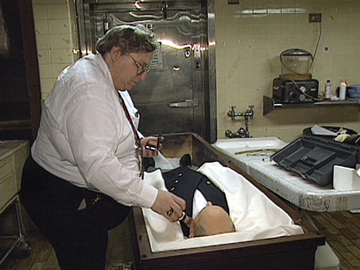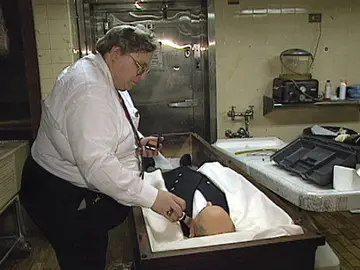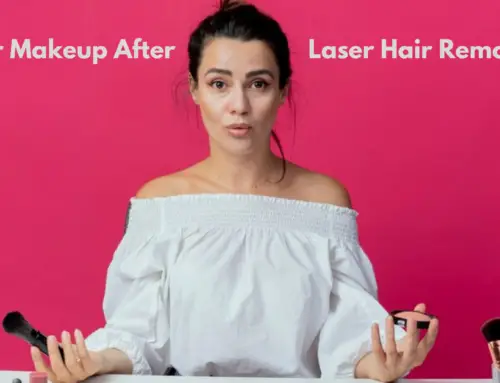Becoming a mortuary makeup artist is a unique and specialized career path that requires both artistic talent and a deep understanding of the grief process. It may come as a surprise to many that mortuary makeup artists play a crucial role in helping grieving families find comfort and closure by ensuring their loved ones look peaceful and natural during their final farewell.
To become a mortuary makeup artist, one must first acquire a strong foundation in makeup artistry through formal education or apprenticeships. Additionally, gaining knowledge in mortuary science or funeral services can provide essential insights into the funeral industry and the specific needs of bereaved families. Furthermore, developing sensitivity and compassion towards the grieving process is essential for this profession, as mortuary makeup artists must navigate emotional situations with empathy and professionalism.
If you’re interested in becoming a mortuary makeup artist, here’s a step-by-step guide to help you get started:
- Educate Yourself: Research and enroll in a reputable mortuary science program.
- Gain Experience: Seek internships or apprenticeships to learn the practical aspects of the profession.
- Obtain a License: Meet the licensing requirements set by your state or country.
- Build a Portfolio: Create a portfolio showcasing your skills and professional work.
- Network: Connect with funeral homes, mortuaries, and industry professionals to find job opportunities.
By following these steps, you can pave your way towards a rewarding career as a mortuary makeup artist.

The Art of Transforming and Honoring: Becoming a Mortuary Makeup Artist
Behind every closed casket, there is an artist who works meticulously to bring peace and solace to grieving families. As a mortuary makeup artist, you have the unique opportunity to use your skills to bring comfort and closure to those who have lost a loved one. This delicate art form requires both technical expertise and a compassionate heart. In this article, we will explore the journey of becoming a mortuary makeup artist, from the necessary skills and qualifications to the steps you can take to embark on this rewarding career path.
Understanding the Role of a Mortuary Makeup Artist
Before diving into the requirements and steps to become a mortuary makeup artist, it is essential to understand the role and responsibilities associated with this profession. As a mortuary makeup artist, your primary duty is to prepare the deceased for public viewing by applying makeup and cosmetics to enhance their appearance. Your goal is not to drastically alter their features but to create a natural and peaceful appearance that brings comfort to the grieving families.
In addition to makeup application, mortuary makeup artists may also be responsible for hairstyling, nail care, and skincare. Attention to detail is paramount, as you must ensure that the deceased’s appearance aligns with their family’s wishes and cultural customs. This role requires sensitivity, empathy, and professionalism as you work closely with grieving individuals during an emotionally challenging time.
Now that we have a deeper understanding of the role, let’s explore the necessary steps to become a mortuary makeup artist.
Step 1: Obtain the Required Education and Training
While there is no specific degree or educational program exclusively for mortuary makeup artistry, it is highly recommended to pursue formal education and training in cosmetology or mortuary science. Both fields provide a strong foundation in the skills required for this profession.
To become a licensed cosmetologist, you must complete a state-approved cosmetology program, which typically involves a specific number of training hours and passing a licensing exam. During your cosmetology education, you will learn essential skills such as makeup application, hairstyling, and skincare. These skills will serve as the building blocks for your future career as a mortuary makeup artist.
If you prefer a more specialized route, you may choose to pursue a degree or certification in mortuary science. These programs focus specifically on funeral services and provide in-depth training in embalming, restorative art, and mortuary makeup application. While not every state requires formal education in mortuary science to become a mortuary makeup artist, it can give you a competitive edge in the field.
Step 2: Gain Practical Experience
After completing your formal education or training, the next step is to gain practical experience in the field. Seek out opportunities to work in funeral homes, mortuaries, or with experienced mortuary makeup artists. This hands-on experience will allow you to refine your skills, understand the specific requirements of the job, and develop your professional network within the industry.
During your practical experience, you will encounter a variety of scenarios and situations. It is important to approach each one with professionalism, empathy, and a willingness to learn. This experience will help you build confidence in your abilities and prepare you for the diverse needs and expectations of grieving families.
Step 3: Obtain the Necessary Licenses and Certifications
Depending on your location, you may need to obtain specific licenses or certifications to practice as a mortuary makeup artist. Research the requirements of your state or country to ensure that you meet all necessary qualifications.
For example, in the United States, some states require mortuary makeup artists to hold a cosmetology license in addition to any other specific requirements for funeral directors or embalmers. Be sure to thoroughly understand the regulations and licensing requirements of your jurisdiction.
Step 4: Build Your Portfolio and Network
A portfolio showcasing your skills and expertise is essential in the mortuary makeup artistry field. As you gain experience, document your work by taking high-quality photographs of before and after transformations. These images will serve as evidence of your abilities and can be presented to potential clients or employers.
Additionally, networking within the funeral services industry can open doors to new opportunities. Attend industry events, join professional organizations, and connect with other professionals in related fields. Building a strong network can lead to referrals, collaborations, and valuable advice from those who have established themselves in the industry.
Step 5: Develop Your Soft Skills
In addition to technical skills, soft skills are crucial for success as a mortuary makeup artist. Compassion, empathy, and the ability to communicate effectively with grieving families are essential in this line of work. The ability to listen attentively, handle sensitive situations delicately, and provide emotional support will set you apart as a trusted and valued professional.
Continuously develop your emotional intelligence and interpersonal skills to ensure that you can offer the highest level of support to grieving families and create a comforting environment during their time of need.
Step 6: Stay Informed and Engaged in the Industry
As with any profession, it is important to stay up to date with the latest trends, techniques, and industry standards in mortuary makeup artistry. Attend workshops, conferences, and continuing education courses to expand your knowledge and refine your skills.
Engaging with professional organizations and online communities can also provide valuable resources and networking opportunities. Stay connected with others in the industry, participate in discussions, and exchange knowledge and experiences to stay at the forefront of the field.
Conclusion
Becoming a mortuary makeup artist requires a unique combination of technical skill, empathy, and professionalism. By obtaining the necessary education, gaining practical experience, obtaining licenses and certifications, and building a strong portfolio and network, you can embark on a fulfilling career in this field. Remember to continuously develop your soft skills, stay informed about industry advancements, and approach your work with compassion and sensitivity. As a mortuary makeup artist, you have the opportunity to provide solace and support to grieving families during one of the most challenging times in their lives.
Key Takeaways
- A mortuary makeup artist is a professional who specializes in applying makeup to deceased individuals.
- To become a mortuary makeup artist, you will need to pursue formal education and training in mortuary science and cosmetology.
- Building a strong portfolio of your work and gaining practical experience in the field is crucial for success in this profession.
- Attention to detail, empathy, and the ability to work in a sensitive and professional manner are important traits for a mortuary makeup artist.
- Networking with funeral homes and industry professionals can help you find job opportunities and advance your career as a mortuary makeup artist.
Frequently Asked Questions
Here are some commonly asked questions about becoming a mortuary makeup artist:
1. What qualifications do I need to become a mortuary makeup artist?
To become a mortuary makeup artist, you will generally need to complete a degree or certificate program in mortuary science or cosmetology. This will provide you with the necessary knowledge and skills in embalming and makeup application. Additionally, you may need to obtain a state license or certification depending on your location.
Having a background in art or makeup artistry can also be beneficial. It is important to have a strong understanding of color theory, facial anatomy, and the ability to recreate natural-looking appearances. Continuing education and attending workshops or seminars in mortuary makeup can also help enhance your skills and knowledge in this specialized field.
2. What does a mortuary makeup artist do?
A mortuary makeup artist is responsible for applying makeup to deceased individuals in preparation for viewings and funerals. They aim to restore a natural appearance to the deceased, enhancing their features and creating a peaceful and dignified presentation. This involves techniques such as contouring, color correction, and the use of special makeup products that are designed for long-lasting wear.
In addition to makeup application, a mortuary makeup artist may also assist with other aspects of the preparation process, such as hair styling and setting features for a natural expression. They work closely with funeral directors and families to ensure the deceased’s appearance meets their wishes and cultural practices.
3. How can I gain practical experience as a mortuary makeup artist?
Gaining practical experience as a mortuary makeup artist can be achieved through various paths. One option is to seek employment or apprenticeship at a funeral home or mortuary, where you can learn from experienced professionals in the field. This will provide you with hands-on experience and an opportunity to observe and participate in the embalming and makeup process.
Another option is to volunteer your services at local funeral homes or reach out to funeral directors and offer to assist with makeup application for their clients. This can help you develop your skills, build a portfolio, and establish connections within the industry.
4. What are the challenges of being a mortuary makeup artist?
Being a mortuary makeup artist is a unique and emotionally demanding profession. One of the main challenges is dealing with the grief and sensitive nature of the work. You will be working with grieving families and handling deceased individuals, which requires compassion, empathy, and the ability to maintain professionalism in difficult situations.
Additionally, the hours can be irregular and may include evenings, weekends, and holidays, as funerals and viewings occur at various times. It is important to have good time management skills and the ability to prioritize tasks effectively.
5. Are there any additional skills or qualities that are important for a mortuary makeup artist?
In addition to makeup application skills, there are several other qualities that are important for a mortuary makeup artist. These include:
- Attention to detail
- Ability to work independently
- Strong communication skills
- Ability to work well under pressure
- Respect for cultural and religious practices
- Professionalism and confidentiality

To become a mortuary makeup artist, you will need to complete a cosmetology or esthetics program to learn the basics of makeup application. Obtaining a license or certification in mortuary cosmetology can further enhance your skills in the field.
Additionally, gaining experience through internships or apprenticeships at funeral homes or mortuaries is crucial for developing your expertise in working with deceased individuals. Building a portfolio of your work and establishing professional connections within the industry can also help you succeed as a mortuary makeup artist.






Leave A Comment